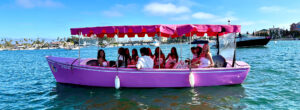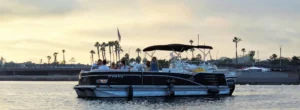Introduction
The world of recreational boating is undergoing a significant transformation with the advent of electric boats. As environmental concerns and technological advancements continue to shape various industries, boating is no exception. Electric boats are emerging as a viable and attractive alternative to traditional fuel-powered vessels, offering a range of benefits that appeal to both seasoned boaters and newcomers alike. This article explores how electric boats are changing the face of recreational boating, from environmental benefits to market growth and future prospects.
With a growing emphasis on sustainability and efficiency, electric boats represent a major shift in how we approach water-based recreation. These vessels are not only eco-friendly but also provide a superior boating experience in terms of noise reduction, maintenance, and overall enjoyment. As we delve into the various aspects of this transformation, it becomes clear that electric boats are set to play a pivotal role in the future of recreational boating.
In this article, we will explore the many dimensions of electric boats, including their environmental impact, cost efficiency, technological advancements, and the broader implications for the boating industry. Join us as we navigate the exciting waters of electric boating and discover how these innovations are reshaping the boating landscape.
Environmental Benefits
One of the most significant advantages of electric boats is their positive impact on the environment. Traditional fuel-powered boats emit a considerable amount of greenhouse gases and other pollutants, contributing to air and water pollution. In contrast, electric boats produce zero emissions, significantly reducing their carbon footprint and helping to preserve marine ecosystems.
The use of electric propulsion systems also means that electric boats operate more quietly than their fuel-powered counterparts. This reduction in noise pollution is beneficial for both wildlife and humans, creating a more serene and enjoyable boating experience. Marine animals, in particular, are less disturbed by the quieter engines, which helps to protect their natural habitats.
Furthermore, the adoption of electric boats supports broader environmental goals, such as reducing our reliance on fossil fuels and promoting renewable energy sources. As more boaters choose electric vessels, the demand for clean energy technologies and sustainable practices within the boating industry will continue to grow, leading to further innovations and environmental benefits.
Cost Efficiency
Electric boats offer notable cost advantages over traditional fuel-powered boats. One of the most significant savings comes from the reduction in fuel costs. Charging an electric boat’s battery is generally much cheaper than filling up a fuel tank, resulting in substantial long-term savings for boat owners.
Maintenance costs are also lower for electric boats. Electric motors have fewer moving parts than internal combustion engines, which means there are fewer components that can wear out or require regular servicing. This simplicity translates to reduced maintenance expenses and less downtime for repairs, allowing boaters to spend more time on the water.
Additionally, electric boats can benefit from incentives and rebates offered by various governments and organizations to promote the adoption of clean energy technologies. These financial incentives can help offset the initial cost of purchasing an electric boat, making them more accessible to a wider range of consumers.
Technological Advancements
The rise of electric boats has been driven by significant technological advancements in battery technology, propulsion systems, and overall boat design. Modern electric boats are equipped with high-capacity lithium-ion batteries that provide longer cruising ranges and faster charging times compared to older battery technologies. These improvements make electric boats more practical and appealing for a variety of recreational activities.
Innovations in electric propulsion systems have also enhanced the performance and efficiency of electric boats. Advanced motor designs offer smooth and responsive handling, allowing for precise control and maneuverability on the water. Additionally, the integration of smart technologies, such as GPS navigation and real-time performance monitoring, further enhances the boating experience.
Boat manufacturers are continuously exploring new materials and designs to optimize the efficiency and sustainability of electric boats. Lightweight materials, streamlined hull designs, and energy-efficient features are being incorporated into modern electric boats, making them more competitive with traditional vessels in terms of performance and functionality.
User Experience
Electric boats provide a unique and enhanced user experience compared to traditional fuel-powered boats. One of the most notable differences is the quiet operation of electric motors. The absence of engine noise allows boaters to enjoy the natural sounds of the water and surroundings, creating a more peaceful and immersive experience.
The smooth and responsive handling of electric boats also contributes to a more enjoyable ride. Electric motors deliver instant torque, providing quick acceleration and precise control. This responsiveness makes electric boats ideal for activities such as fishing, cruising, and water sports, where maneuverability and control are essential.
Additionally, electric boats are generally easier to operate and maintain. The simplicity of electric propulsion systems means that there are fewer components to manage and fewer potential issues to troubleshoot. This ease of use makes electric boats an attractive option for both novice boaters and experienced enthusiasts looking for a hassle-free boating experience.
Market Growth and Adoption
The market for electric boats is experiencing rapid growth as more consumers recognize the benefits of electric propulsion. Data shows a steady increase in the sales and popularity of electric boats, driven by a combination of environmental awareness, technological advancements, and cost efficiency. This trend is expected to continue as the boating industry embraces sustainable practices and clean energy solutions.
Several factors are driving the adoption of electric boats. Increased consumer interest in eco-friendly products, coupled with government incentives and regulations promoting clean energy, has created a favorable environment for the growth of the electric boat market. Furthermore, advancements in battery technology and charging infrastructure have made electric boats more accessible and practical for everyday use.
Manufacturers are responding to this demand by expanding their electric boat offerings and investing in research and development to improve performance and efficiency. As a result, consumers now have a wider range of electric boat models to choose from, catering to various preferences and boating activities.
Challenges and Limitations
Despite the many benefits, electric boats face certain challenges and limitations that need to be addressed. One of the primary concerns is the limited battery range compared to traditional fuel tanks. While advancements in battery technology have significantly improved range, some electric boats may still have shorter operational times between charges, which can be a limitation for longer trips.
Charging infrastructure is another challenge. While the number of charging stations for electric boats is increasing, it is still not as widespread as traditional fuel stations. Boaters need to plan their trips carefully to ensure they have access to charging facilities, especially in remote or less-developed areas.
Additionally, the initial cost of electric boats can be higher than that of conventional boats, primarily due to the cost of high-capacity batteries and advanced propulsion systems. However, this cost difference is gradually decreasing as technology advances and production scales up, making electric boats more competitive in the market.
Impact on the Boating Industry
The rise of electric boats is having a profound impact on the boating industry, influencing manufacturers, service providers, and consumers alike. Boat manufacturers are increasingly investing in electric propulsion technology and sustainable boat design, leading to a shift in industry standards and practices. This focus on innovation is driving the development of new models that are more efficient, environmentally friendly, and user-friendly.
Service providers, such as marinas and boat rental companies, are also adapting to the growing presence of electric boats. Many are installing charging stations and offering maintenance services tailored to electric propulsion systems. This shift is creating new business opportunities and promoting the adoption of electric boats among recreational boaters.
Consumers are becoming more informed and discerning, seeking out environmentally responsible and cost-effective boating options. This demand is encouraging further innovation and competition within the industry, ultimately benefiting the end user with better products and services.
Case Studies and Success Stories
Several electric boat models have already made significant waves in the market, showcasing the potential and success of electric propulsion in recreational boating. For example, the Duffy electric boats have become synonymous with quiet, eco-friendly cruising, offering a serene and enjoyable boating experience for families and groups.
Another success story is the Candela Speed Boat, which combines cutting-edge hydrofoil technology with electric propulsion to deliver a fast, efficient, and remarkably smooth ride. These innovative designs are pushing the boundaries of what electric boats can achieve, demonstrating their viability and appeal in various boating segments.
Testimonials from users and industry experts highlight the positive experiences and benefits of electric boating. Many boaters appreciate the reduced noise, lower maintenance costs, and environmental benefits, reinforcing the case for broader adoption of electric boats in recreational boating.
Future Outlook
The future of electric boats in recreational boating looks promising, with continued advancements in technology and growing consumer interest driving the market forward. As battery technology evolves, we can expect even longer ranges, faster charging times, and more efficient power management systems, making electric boats more versatile and practical for all types of boating activities.
Innovations in materials and design will further enhance the performance and sustainability of electric boats. Lightweight, durable materials, combined with aerodynamic and hydrodynamic designs, will improve efficiency and reduce energy consumption, making electric boats even more competitive with traditional vessels.
In the long term, the widespread adoption of electric boats will contribute to a cleaner and more sustainable boating industry. As more consumers, manufacturers, and service providers embrace electric propulsion, we can look forward to a future where recreational boating is not only enjoyable but also environmentally responsible and economically viable.
Conclusion
Electric boats are revolutionizing the recreational boating industry by offering a sustainable, cost-effective, and enjoyable alternative to traditional fuel-powered vessels. From their environmental benefits and cost savings to the advancements in technology and the enhanced user experience, electric boats are set to become a mainstay in the boating world.
As we navigate the future of recreational boating, the shift towards electric propulsion represents a positive and necessary change. Embracing this transformation will not only improve our boating experiences but also contribute to the preservation of our precious marine environments. Whether you’re a seasoned boater or new to the world of boating, electric boats offer an exciting and responsible way to enjoy the water.
Excited for an adventure with us or have a question? Call us at: (949) 675-8433 Book Your Ride with us: Click here to Book


